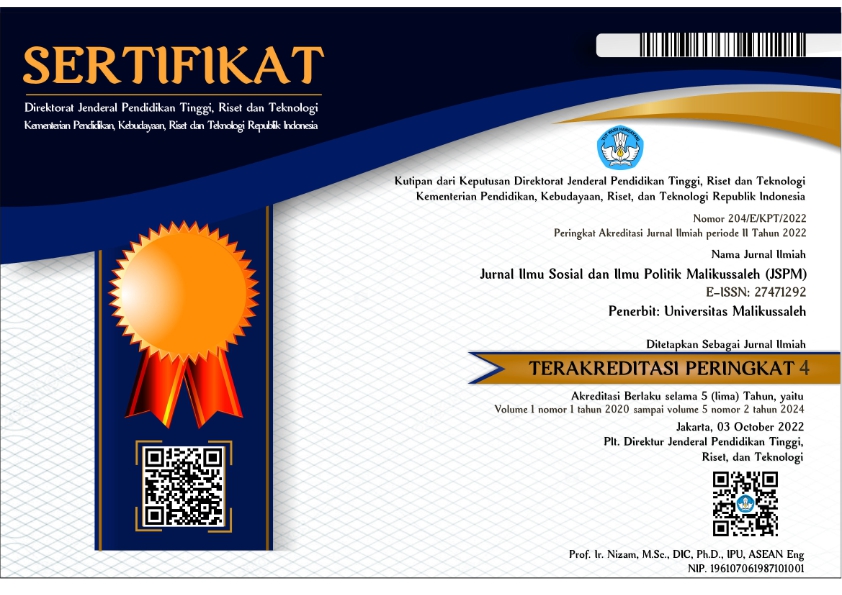PEMBERDAYAAN KOMUNITAS LOKAL DALAM PENGEMBANGAN DESA WISATA
Abstract
This research aims to analyze empowerment in the rural tourism sector which relies on local communities who do not have experience in the tourism sector. The concept used in this research is empowering local communities that rely on local knowledge and culture. The method used in this research is a qualitative case study, thus prioritizing the novelty of the case and in-depth interviews with several informants. Several previous studies in Indonesia show that rural communities have not been able to take advantage of local potential, so there is still little research that shows the success of independent villages. The results of this study describe the success of rural communities in empowering local-based communities in the tourism sector. This research is useful as a reference for the success of local community empowerment. The Pantai Indah Peunaga Pasi rural tourism development began at the end of 2018 and continues to this day. Rural tourism development is in accordance with the concept of empowering local communities, which prioritizes the independent learning process. The local community involved in it relies heavily on local potential, knowledge, and culture. As a result, local communities can improve welfare without trying to preserve the environment.
Riset ini bertujuan untuk menganalisis pemberdayaan pada sektor desa wisata yang bertumpu pada komunitas lokal yang tidak memiliki pengalaman di bidang kepariwisataan. Konsep yang digunakan dalam riset ini adalah pemberdayaan komunitas lokal yang mengandalkan pengetahuan dan kebudayaan lokal. Metode yang digunakan dalam riset ini adalah kualitatif studi kasus, sehingga mengutamakan kebaruan kasus dan wawancara mendalam terhadap beberapa informan. Beberapa riset terdahulu di Indonesia menunjukkan bahwa masyarakat desa belum bisa memanfaatkan potensi lokal, sehingga masih sedikit riset yang menunjukkan keberhasilan desa mandiri. Hasil penelitian ini menguraikan tentang keberhasilan masyarakat pedesaan dalam pemberdayaan berbasis komunitas lokal pada sektor kepariwisataan. Penelitian ini bermanfaat untuk memperkaya referensi tentang keberhasilan penberdayaan komunitas lokal. Pengembangan desa wisata Pantai Indah Peunaga Pasi dimulai pada akhir 2018 dan masih berlangsung sampai saat ini. Pengembangan desa wisata tersebut sangat sesuai dengan konsep pemberdayaan komunitas lokal yang mengutamakan proses belajar secara mandiri. Komunitas lokal yang terlibat di dalamnya sangat mengandalkan potensi, pengetahuan, dan kebudayaan lokal. Komunitas lokal sebagai penyelenggara desa wisata mampu meningkatkan kesejahteraan tanpa mengesampingkan upaya pelestarian lingkungan.
Keywords
Full Text:
PDFReferences
Abdillah, L., & Prayogo, D. (2020). Ecotourism development based on local community empowerment : A case study in the forest village community institution of Wana Cendana , Dago Village , Bogor Regency. 3(1), 57–68.
Ahmad, M. S., & Abu Talib, N. B. (2016). Analysis of Community Empowerment on Projects Sustainability: Moderating Role of Sense of Community. Social Indicators Research, 129(3), 1039–1056. https://doi.org/10.1007/s11205-014-0781-9
Amalu, T. E., Otop, O. O., Duluora, E. I., Omeje, V. U., & Emeana, S. K. (2018). Socio-economic impacts of ecotourism attractions in Enugu state, Nigeria. GeoJournal, 83(6), 1257–1269. https://doi.org/10.1007/s10708-017-9830-7
Đukić, V., & Volić, I. (2017). The importance of documenting and including traditional wisdom in community-based ecotourism planning: A case study of the Nature Park Ponjavica in the village of Omoljica (Serbia). SAGE Open, 7(1). https://doi.org/10.1177/2158244016681048
Dwijatenaya, I. B. M. A., & Ince, R. (2016). Pembangunan Perdesaan dan Kemitraan Agribisnis : Suatu Model Pemberdayaan Masyarakat untuk Kesejahteraan. 137.
Hegde, N., Elias, M., Lamers, H. A. H., & Hegde, M. (2017). Engaging local communities in social learning for inclusive management of native fruit trees in the Central Western Ghats, India. Forests Trees and Livelihoods, 26(1), 65–83. https://doi.org/10.1080/14728028.2016.1257398
Ife, J., & Tesoriero, F. (2008). Community Development: Alternatif Pengembangan Masyarakat di Era Globalisasi (1st ed.). Pustaka Pelajar.
Mansour Fakih. (2009). Runtuhnya Teori Pembangunan dan Globalisasi. INSISTPress.
Marjanto, D. K., Budiana, S., Kusumah, S. D., Bakti, U., Biantoro, S., A, G., & Nugroho, A. (2013). Kearifan Lokal & Lingkungan. PT Gading Inti Prima, 70–95. http://repositori.kemdikbud.go.id/398/1/Bunga
Mukhtar. (2013). Metode Praktis dan Penelitian Deskriptif Kualitatif (1st ed.). REFERENSI (GP Press Group).
Njoya, E. T., & Seetaram, N. (2018). Tourism Contribution to Poverty Alleviation in Kenya: A Dynamic Computable General Equilibrium Analysis. Journal of Travel Research, 57(4), 513–524. https://doi.org/10.1177/0047287517700317
Santosa, A., Hidayat, S., & Arruzi, R. K. (2017). Sekolah Hijau, Sebuah Alternatif Model Pemberdayaan Masyarakat Perdesaan.
Sardjo, S., Darmajanti, L., & Boediono, K. C. (2017). Implementasi Model Evaluasi Formatif Program Pembangunan Sosial (EFPPS): Partisipasi Multipihak dalam Evaluasi Program (1st ed.). FISIP UI dan Yayasan Pustaka Obor Indonesia.
Stronza, A. L., Hunt, C. A., & Fitzgerald, L. A. (2019). Ecotourism for Conservation? Annual Review of Environment and Resources, 44(1), 229–253. https://doi.org/10.1146/annurev-environ-101718-033046
Timko, J., Green, S., Sharples, R., & Grinde, A. (2015). Using a community-driven approach to identify local forest and climate change priorities in Teslin, Yukon. Cogent Social Sciences, 1(1), 1–12. https://doi.org/10.1080/23311886.2015.1047564
Törn, A., Siikamäki, P., Tolvanen, A., Kauppila, P., & Rämet, J. (2008). Local people, nature conservation, and tourism in northeastern Finland. Ecology and Society, 13(1). https://doi.org/10.5751/ES-02202-130108
Uzama, A., & Walter, P. (2018). Incorporating ecotourism into social education (shakai kyouiku 社会教育) and lifelong learning (shougai gakushuu 生涯学習) in Japan. Journal of Adult and Continuing Education, 24(1), 18–36. https://doi.org/10.1177/1477971417753975
Wang, R., Eisenack, K., & Tan, R. (2019). Sustainable rural renewal in China : archetypical patterns. 24(3).
Yang, M., Hens, L., Ou, X., & Wulf, R. De. (2009). Tourism : An Alternative to Development ? 29(1), 75–81. https://doi.org/10.1659/mrd.1051
Yi, J., Ryan, C., & Wang, D. (2021). China’s Village Tourism Committees: A Social Network Analysis. Journal of Travel Research, 60(1), 117–132. https://doi.org/10.1177/0047287519892324
Yin, R. K. (2008). Studi Kasus Desai dan Metode (1st ed.). PT RAJAGRAFINDO PERSADA.
Zid, M., & Alkhudri, A. T. (2016). Sosiologi Pedesaan: Teoritesi dan Perkembangan Kajian Pedesaan di Indonesia. PT RAJAGRAFINDO PERSADA.
DOI: https://doi.org/10.29103/jspm.v4i2.10227
 Article Metrics
Article Metrics
 Abstract Views : 717 times
Abstract Views : 717 times
Refbacks
- There are currently no refbacks.
Copyright (c) 2023 Ligar Abdillah

This work is licensed under a Creative Commons Attribution-ShareAlike 4.0 International License.
INDEXED BY:




.png)









Redaksi Jurnal Ilmu Sosial dan Ilmu Politik Malikussaleh (JSPM): Gedung Fakultas Ilmu Sosial dan Ilmu Politik Universitas Malikussaleh. Kampus Bukit Indah Jln. Sumatera No.8, Kec. Muara Satu Kota Lhokseumawe, Prov. Aceh, Indonesia. eMail: jspm@unimal.ac.id

This work is licensed under a Creative Commons Attribution-NonCommercial-ShareAlike 4.0 International License



.png)



